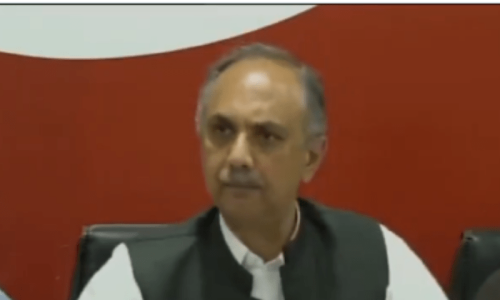
NEW DELHI: Talking past each other as they often do, the foreign secretaries of India and Pakistan raised their respective preferred topics on Tuesday without apparently conceding much to the other.
If there was any agreement that could be construed as positive, it was not made public.
Pakistan’s Foreign Secretary Aizaz Ahmed Chaudhry, predictably as happens in inclement diplomatic weather, raised the issues of Jammu and Kashmir and the capture of an Indian intelligence officer in Balochistan.
Islamabad raises RAW’s involvement, Samjhauta probe; New Delhi puts emphasis on Pathankot inquiry, ‘Pakistan-based terror groups’
Indian Foreign Secretary Subrahmanyam Jaishankar underscored the importance of speeding up the Pathankot investigations and arresting the culprits New Delhi had identified.
Indian reports described the meeting, held on the margins of an Afghanistan-related international gathering, as an occasion for “plain speaking” by both sides.
They are also believed to have deliberated on ways to take forward the Comprehensive Bilateral Dialogue (CBD), which has not made any progress so far.
India raised the issue of Masood Azhar, who it describes as the mastermind behind the Jan 2 attack on an Indian air force base in Pathankot, and now wants listed as an international terrorist at the UN.
Mr Jaishankar conveyed to his Pakistani counterpart that there was need for an early progress in the Pathankot investigation and the trial of suspects behind the Nov 2008 attacks in Mumbai.
According to Indian media reports, he also firmly rebutted Islamabad’s allegations of New Delhi’s involvement in Balochistan and other areas.
India has been pressing for action against terrorists responsible for the audacious attack on the premier IAF base, to move ahead in the talks.
“Pakistan cannot be in denial on the impact of terrorism on bilateral relations,” Mr Jaishankar told Mr Chaudhry. Terrorist groups targeting India cannot be allowed to operate with impunity, he added.
According to the Pakistan High Commission, the meeting provided a useful opportunity to exchange views on recent developments in the bilateral context.
“In line with our prime minister’s vision of a peaceful neighbourhood, the Foreign Secretary underscored Pakistan’s commitment to friendly relations with all its neighbours, including India,” the Pakistan statement said.
It said all outstanding issues, including the Jammu and Kashmir dispute, were discussed.
In the meeting, Pakistan emphasised that “Kashmir remains the core issue that requires a just solution, in accordance with UNSC resolutions and wishes of the Kashmiri people”.
The foreign secretary also took up the matter of the capture of Kulbushan Jadhav, an officer of the Research and Analysis Wing (RAW), and expressed serious concern over the Indian intelligence agency’s involvement in subversive activities in Balochistan and Karachi.
He said such acts undermined efforts to normalise relations between the two countries.
He also conveyed concern over efforts by the Indian authorities for the release of the prime suspects of the Samjhauta Express blasts of 2007 in which 42 Pakistanis had lost their lives.
According to the Pakistan statement, Aizaz Chaudhry expressed the confidence that, building on the goodwill generated by the recent high-level contacts, the two countries should remain committed to a sustained, meaningful and comprehensive dialogue process.
In this spirit, the Foreign Secretary underscored the need for an early commencement of comprehensive dialogue for which the Indian foreign secretary’s visit to Pakistan is due.
He also conveyed concern over the environment being created in India for the release of the prime suspects of the Samjhauta Express blasts. He further pointed out that, despite repeated requests, India had not shared with Pakistan the investigation reports into the train tragedy.
Agencies add: The Pakistan High Commission in New Delhi said in a statement it had raised “all outstanding issues” during the foreign secretaries’ meeting, including the Kashmir issue.
The commission also said in a tweet that its foreign secretary underscored Pakistan’s commitment to “friendly relations” with all of its neighbours, including India.
On its part, New Delhi urged Islamabad to make “visible progress” on the Pathankot attack probe.
“India’s FS (foreign secretary) emphasised the need for early and visible progress on the Pathankot terrorist attack investigation as well as the Mumbai case trial in Pakistan,” Indian foreign ministry spokesman Vikas Swarup said.
“The FS clearly conveyed that Pakistan cannot be in denial on the impact of terrorism on bilateral relationship. Terrorist groups based in Pakistan must not be allowed to operate with impunity,” he said in the statement.
Talks between the top diplomats were postponed after the assault on the Indian air force base in Pathankot in January.
Seven Indian soldiers died in the attack.
Pakistan sent investigators to the scene of the attack last month as part of its own probe.
The Pathankot air base attack came just days after Indian Prime Minister Narendra Modi became the first Indian leader to visit Pakistan in 12 years, raising hopes of a softening in relations between Islamabad and New Delhi.
Published in Dawn, April 27th, 2016
















































Dear visitor, the comments section is undergoing an overhaul and will return soon.